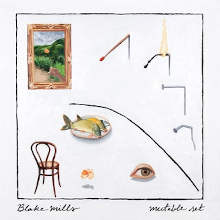The Graham Album Review #2031

Click on CD Cover for Audio Review in streaming mp3 format | |
Blake Mills: Mutable Set
by George Graham
(Verve Records as broadcast on WVIA-FM 6/17/2020)

Click on CD Cover for Audio Review in streaming mp3 format | |
Blake Mills: Mutable Set
by George Graham
(Verve Records as broadcast on WVIA-FM 6/17/2020)
It’s safe to say that most popular performers are associated with a particular sound and style. Sometimes they try to branch out, but more often than not, the result fall short of the popularity of their trademark sound. On the other hand there are studio musicians for whom versatility is an important asset, important in getting work. So often, solo albums by musicians who are mainly studio players can be all over the place, an effort to show off that versatility.
This week we have a distinctive, and perhaps a little unusual record by an artist who first established a reputation as a studio guitarist at a rather young age, playing on records by artists including Bruce Hornsby and the Avett Brothers, and then had a career as a producer, leading sessions with The Alabama Shakes, John Legend, Fiona Apple, even and Jay-Z, racking up a couple of Grammy nominations along the way. He is Blake Mills, whose new album is called Mutable Set.
Before his steady studio work in his Los Angeles hometown, he was a founder of a band called Simon Dawes, which would become the acclaimed roots rock band Dawes after Mills’ departure.
Mills has made three previous solo albums starting out as a kind of roots-rock artist, on his 2010 release Break Mirrors with a bit of country twang. By now, on new his fourth album Mutable Set, Mills combines a singer-songwriter direction with lyrics running from love songs to a lament on climate change, with a lot of sonic experimentation, with sometimes atmospheric, sometimes murky and mysterious sounds. There are some curious musical arrangements, and guest appearances by such people as Gabriel Kahane on keyboards, whose own album won our Graham Award best album of 2018, and Rob Moose from the chamber ensemble yMusic on strings. For an artist who was known as a hotshot guitarist who won an enthusiastic endorsement from Eric Clapton, Mills’ guitars are much more textural on Mutable Set, often acoustic. The mood is frequently brooding, and the combinations of sounds can be unusual. But interestingly, almost all those sounds are acoustic or from conventional electric guitars. Synthesizers are largely absent, and some of the keyboard sounds have a vintage quality to them. The recording technique can also lend an indistinct haze or muffled quality. The result is music than ranges from contemplative, almost trance-like, to rather unsettling, sometimes in the same song.
Opening is a piece that exemplifies that kind of dichotomy Never Forever which begins with one of those sonically brooding interludes, <<>> before about three minutes in, becoming a acoustic-guitar based tune, that turns out to be a love song. <<>>
That leads into May Later, with a kind of old-fashioned quality with its waltz time, but with curious instrumental sounds added. <<>>
More acoustic in sound is Eat My Dust. But here Mills’ vocals add to the quirkiness. <<>>
The album’s lengthiest track is Money Is the One True God which is also quite impressionistic in sound. <<>> The latter part of the piece is a series of sonic experiments, including with a string section. <<>>
Gabriel Kahane appears on piano on the track Summer All Over about global warming, a song like several others, written jointly by Mills and Cass McCombs. <<>>
My Dear One is a song Mills wrote for his wife, Gabi Zecchetto. Again, the combination of sounds is intriguing, with the percussion including some mechanical squeaks from whatever was being used. <<>>
The other track featuring Gabriel Kahane, a piece co-written by Mills and Kahane, is called Farsickness, which has some of Kahane’s almost classical harmonic approach, matchi ng the somewhat brooding lyrics. <<>>
There is one instrumental on the album, Mirror Box on which Blake’s acoustic guitar takes the lead, with a number of curious little interjections. <<>>
Mutable Set, the new fourth album by guitarist and producer Blake Mills is about as far from party music as you can get. It’s a fascinating and often brooding album of sonic experimentation. Vocals are not Mills’ biggest strength, but his nearly whispered performances make the album all the more intriguing. The instrumental arrangements are almost always unconventional, with odd combinations of sounds, with instruments that are sometimes unindentifiable. But it all works surprising well, and is an album on which you can keep discovering things each time you listen.
My grade for sound quality is about a B-minus. The sonic experimentation deserves kudos, but the sound can often be a little too murky, and there is a bit of sloppiness with non musical sounds like squeaks left in, and background hiss often quite noticeable. Dynamic range could have been a lot better, given how the arrangements ebb and flow.
It’s hard to figure out what to call Blake Mills’ Mutable Set. In the broadest sense, it’s a singer-songwriter record, but this studio guitarist and producer’s experimentation in the studio has resulted in a rather unclassifiable but quite intriguing record.
(c) Copyright 2020 George D. Graham. All rights reserved.
This review may not be copied to another Web site without written permission.
 To Index of Album Reviews | To George Graham's Home Page. | What's New on This Site.
To Index of Album Reviews | To George Graham's Home Page. | What's New on This Site.